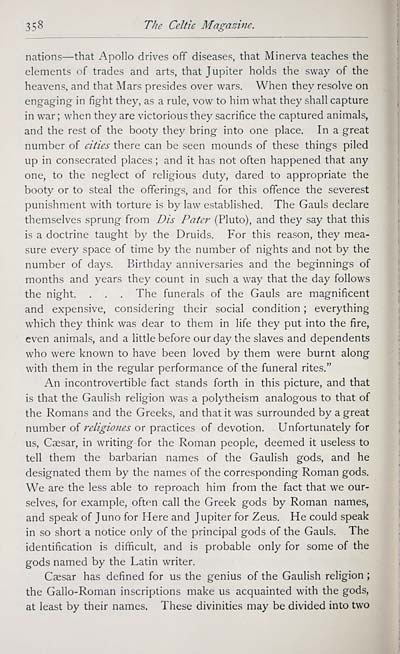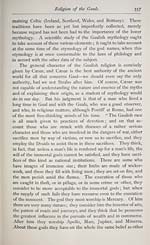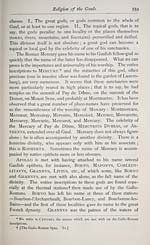Blair Collection > Celtic magazine > Volume 12
(368)
Download files
Complete book:
Individual page:
Thumbnail gallery: Grid view | List view

358 The Celtic Magazine.
nations — that Apollo drives off diseases, that Minerva teaches the
elements of trades and arts, that Jupiter holds the sway of the
heavens, and that Mars presides over wars. When they resolve on
engaging- in fight they, as a rule, vow to him what they shall capture
in war ; when they are victorious they sacrifice the captured animals,
and the rest of the booty they bring into one place. In a great
number of cities there can be seen mounds of these things piled
up in consecrated places ; and it has not often happened that any
one, to the neglect of religious duty, dared to appropriate the
booty or to steal the offerings, and for this offence the severest
punishment with torture is by law established. The Gauls declare
themselves sprung from Dis Pater (Pluto), and they say that this
is a doctrine taught by the Druids. For this reason, they mea-
sure every space of time by the number of nights and not by the
number of days. Birthday anniversaries and the beginnings of
months and years they count in such a way that the day follows
the night. . . . The funerals of the Gauls are magnificent
and expensive, considering their social condition ; everything
which they think was dear to them in life they put into the fire,
even animals, and a little before our day the slaves and dependents
who were known to have been loved by them were burnt along
with them in the regular performance of the funeral rites."
An incontrovertible fact stands forth in this picture, and that
is that the Gaulish religion was a polytheism analogous to that of
the Romans and the Greeks, and that it was surrounded by a great
number of religiones or practices of devotion. Unfortunately for
us, Caesar, in writing for the Roman people, deemed it useless to
tell them the barbarian names of the Gaulish gods, and he
designated them by the names of the corresponding Roman gods.
We are the less able to reproach him from the fact that we our-
selves, for example, often call the Greek gods by Roman names,
and speak of Juno for Here and Jupiter for Zeus. He could speak
in so short a notice only of the principal gods of the Gauls. The
identification is difficult, and is probable only for some of the
gods named by the Latin writer.
Caesar has defined for us the genius of the Gaulish religion ;
the Gallo-Roman inscriptions make us acquainted with the gods,
at least by their names. These divinities may be divided into two
nations — that Apollo drives off diseases, that Minerva teaches the
elements of trades and arts, that Jupiter holds the sway of the
heavens, and that Mars presides over wars. When they resolve on
engaging- in fight they, as a rule, vow to him what they shall capture
in war ; when they are victorious they sacrifice the captured animals,
and the rest of the booty they bring into one place. In a great
number of cities there can be seen mounds of these things piled
up in consecrated places ; and it has not often happened that any
one, to the neglect of religious duty, dared to appropriate the
booty or to steal the offerings, and for this offence the severest
punishment with torture is by law established. The Gauls declare
themselves sprung from Dis Pater (Pluto), and they say that this
is a doctrine taught by the Druids. For this reason, they mea-
sure every space of time by the number of nights and not by the
number of days. Birthday anniversaries and the beginnings of
months and years they count in such a way that the day follows
the night. . . . The funerals of the Gauls are magnificent
and expensive, considering their social condition ; everything
which they think was dear to them in life they put into the fire,
even animals, and a little before our day the slaves and dependents
who were known to have been loved by them were burnt along
with them in the regular performance of the funeral rites."
An incontrovertible fact stands forth in this picture, and that
is that the Gaulish religion was a polytheism analogous to that of
the Romans and the Greeks, and that it was surrounded by a great
number of religiones or practices of devotion. Unfortunately for
us, Caesar, in writing for the Roman people, deemed it useless to
tell them the barbarian names of the Gaulish gods, and he
designated them by the names of the corresponding Roman gods.
We are the less able to reproach him from the fact that we our-
selves, for example, often call the Greek gods by Roman names,
and speak of Juno for Here and Jupiter for Zeus. He could speak
in so short a notice only of the principal gods of the Gauls. The
identification is difficult, and is probable only for some of the
gods named by the Latin writer.
Caesar has defined for us the genius of the Gaulish religion ;
the Gallo-Roman inscriptions make us acquainted with the gods,
at least by their names. These divinities may be divided into two
Set display mode to: Large image | Transcription
Images and transcriptions on this page, including medium image downloads, may be used under the Creative Commons Attribution 4.0 International Licence unless otherwise stated. ![]()
| Early Gaelic Book Collections > Blair Collection > Celtic magazine > Volume 12 > (368) |
|---|
| Permanent URL | https://digital.nls.uk/76465078 |
|---|
| Description | Volume XII, 1887. |
|---|---|
| Shelfmark | Blair.13 |
| Attribution and copyright: |
|
| Description | A selection of books from a collection of more than 500 titles, mostly on religious and literary topics. Also includes some material dealing with other Celtic languages and societies. Collection created towards the end of the 19th century by Lady Evelyn Stewart Murray. |
|---|
| Description | Selected items from five 'Special and Named Printed Collections'. Includes books in Gaelic and other Celtic languages, works about the Gaels, their languages, literature, culture and history. |
|---|

